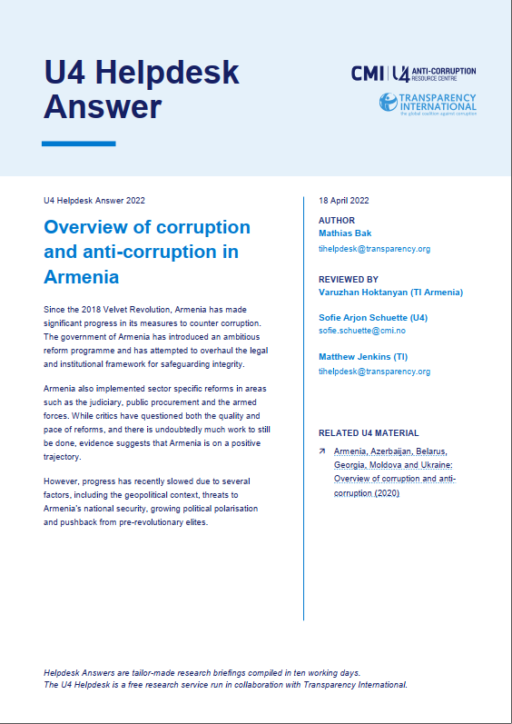
This Anti-Corruption Helpdesk brief was produced in response to a query from a U4 Partner Agency. The U4 Helpdesk is operated by Transparency International in collaboration with the U4 Anti-Corruption Resource Centre based at the Chr. Michelsen Institute.
Query
Please provide an overview of corruption and anti-corruption efforts in Armenia
Summary
Since the 2018 Velvet Revolution, Armenia has made significant progress in its measures to counter corruption. The government of Armenia has introduced an ambitious reform programme and has attempted to overhaul the legal and institutional framework for safeguarding integrity.
Armenia also implemented sector specific reforms in areas such as the judiciary, public procurement and the armed forces. While critics have questioned both the quality and pace of reforms, and there is undoubtedly much work to still be done, evidence suggests that Armenia is on a positive trajectory.
However, progress has recently slowed due to several factors, including the geopolitical context, threats to Armenia's national security, growing political polarisation and pushback from pre-revolutionary elites.
Contents
- Background
- Extent of corruption
- Forms of corruption
- Sectors vulnerable to corruption
- Legal and institutional anti-corruption framework
- Other stakeholders
- References
Main points
- In recent years, Armenia has adopted a range of legal reforms, including new laws that aim to strengthen Armenia's asset recovery regime, new whistleblower protection legislation and new legally binding integrity principles for civil servants.
- Armenia has also reformed its institutional framework for countering corruption with the creation of an anti-corruption commission, a specialised anti-corruption court and a new department for asset recovery in the prosecutor general’s office.
- It is as yet too early to conclude whether these steps will result in a sustained reduction of corrupt activity.
- Initial data seem to suggest that Armenia has experienced a reduction in perceived corruption, but critics point to several remaining gaps in the framework for preventing and countering corruption.
- For instance, observers point out that there are still needs for significant reforms in Armenia’s framework for asset recovery; and steps can still be taken to strengthen integrity in the judiciary.
Authors
Mathias Bak, [email protected]
Reviewers
Varuzhan Hoktanyan (Transparency International Anti-Corruption Center Armenia)
Sofie Arjon Schuette (U4), [email protected]
Matthew Jenkins (TI), [email protected]
Date
17/05/2022

